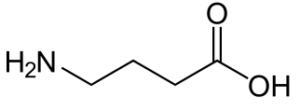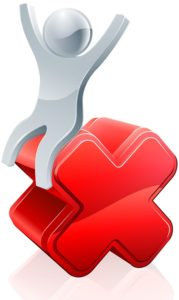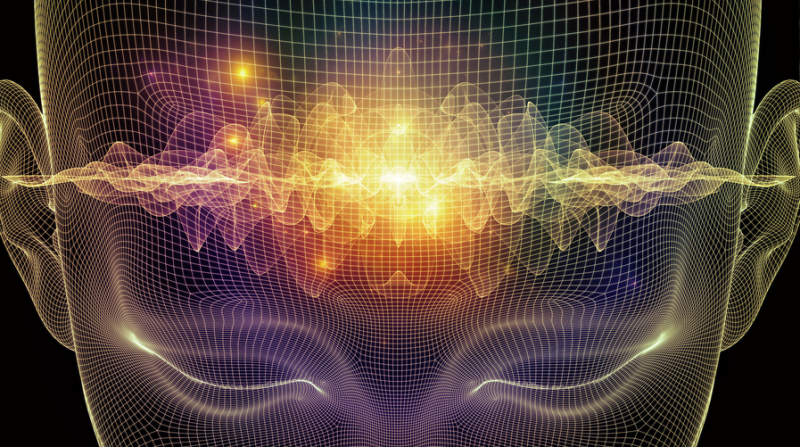Table of Contents
Key Takeaways
- GABA (Gamma-Aminobutyric Acid) is a crucial neurotransmitter that contributes to stress relief, relaxation, and improved sleep quality.
- It deviates from other neurotransmitters due to its inhibitory nature, serving to slow down neuron firing and calm the nervous system.
- While not as potent as some other nootropics, GABA’s effects are pronounced and significant, offering potential benefits like reduced anxiety, stress, and promoting better sleep.
- GABA is generally safe for consumption within the suggested dosage range of 500 – 1000 mg per day.
GABA (gamma-aminobutyric acid) is an amino acid and neurotransmitter. GABA is the primary inhibitory neurotransmitter of your central nervous system. Its role is to keep glutamate, the primary excitatory transmitter, from overwhelming you.
Too much glutamate can cause a seizure, and too much GABA can put you in a coma. A healthy brain maintains a critical balance of GABA and glutamate.
GABA acts like a “brake” on neuron circuits during stress. Low GABA levels can result in anxiety, insomnia, poor mood and restlessness.
Clinical studies show that boosting GABA with a supplement relieves anxiety, stress, and boosts the production of alpha brain waves.[i] If GABA is optimized in your brain you’ll feel focused, relaxed and stress-free.
GABA helps:
- Balance mood. GABA has an inhibitory effect on overly stimulated neurons. Low GABA levels lead to anxiety, depression and insomnia. GABA helps restore that balance. Promoting a more positive mood which improves focus and relaxation.
- Boost Human Growth Hormone. Bodybuilders and athletes use GABA before resistance training. Studies show GABA supplements boost blood levels of Human Growth Hormone. Promoting greater recovery support and lean muscle.
- Recovery from addiction. Some addiction doctors have been administering drugs that enhance the brain’s GABA-receptors. Normalizing GABA receptors takes away the craving and anxiety that one would typically experience in the absence of the addictive drug.
Overview
Gamma-aminobutyric acid (GABA) is the major inhibitory or relaxing neurotransmitter in your brain.[ii] GABA’s primary role is to keep the major excitatory neurotransmitter glutamate in check.

GABA isa naturally occurring amino acid synthesized in brain cells from glutamate. It’s estimated that 40% of the synapses in the human brain work with GABA and therefore have GABA receptors.
GABA enhances normal sleep cycles, and improves blood pressure. GABA stimulates the pituitary gland to secrete Human Growth Hormone. And helps produce endorphins that make you feel good after a workout or sex.
When you normalize GABA levels you’ll experience a reduction in anxiety, insomnia, nervousness, restlessness, lowering blood pressure, and stress.
Benzodiazepine drugs like Valium and Xanax work by increasing GABA receptor sensitivity.[iii]
How do GABA Receptors Work in the Brain?
There are two natural GABA signaling receptors on nerve cells — GABA-A receptor and GABA-B receptor. While each works differently, when GABA binds to one of these receptors, the result is a decrease in that nerve cell’s responsiveness. This means that GABA modulates the signals that nerve cells are able to send.
GABA helps brain health and function in several ways. But two in particular stand out.
- GABA as one of two major inhibitory neurotransmitters works by preventing neural signaling associated with anxiety from reaching other neurons. It does this by attaching to the receptors that would otherwise excite those neurons. Over-stimulating neurons in certain areas of your brain is what causes anxiety-related symptoms.
Researchers in Japan studied the calming effects of GABA with 8 volunteers. They had study subjects cross a suspension bridge as the stressful stimulus. The placebo subjects in this group showed significant drops in blood level markers indicating high stress levels. While the GABA group showed significantly higher blood levels of these same markers.
The placebo subjects in this group showed significant drops in blood level markers indicating high stress levels. While the GABA group showed significantly higher blood levels of these same markers.
GABA worked as a natural relaxant and its effects could be seen within 1 hour of taking GABA. The researchers concluded that GABA could enhance immunity from stress.[iv]
- GABA also helps decrease Beta brain waves and increase Alpha brain waves.[v] Beta brain waves are important for attention, alertness, concentration and developing memories. But excess levels of concentration, particularly during stress, can lead to anxiety, depression, insomnia and more stress.
When you are in an alert state, both Alpha and Beta brain waves can be stimulated. But the type of alertness will determine which brain wave is produced.
Alertness during an Alpha wave state is associated with a relaxed state. And a stressed alert state produces a Beta wave. But an excess of Beta brain waves contributes to a variety of nervous disorders including anxiety and stress.
As a side note, I’m writing this while listening to binaural music which produces an Alpha state. It allows for a relaxed environment which promotes creativity and productivity.
How things go bad
Low levels of GABA are associated with a variety of health problems.
↑ Anxiety[vi], panic attacks, stress and insomnia
↑ Muscle spasms, hypertension, convulsion, Tourette’s Syndrome and epilepsy
↑ Dry skin and wrinkles
↑ Poor digestion, bloating, flatulence, and constipation
When your neurotransmitters, including GABA, are in balance, you feel motivated, productive and energetic. And you feel calm and relaxed during downtime.
When GABA levels are low you feel filled with dread, you’re constantly worried, you have racing thoughts, and you’re frequently late and disorganized.[vii]
Many people in this GABA-slump resort to high carbohydrate foods, and drugs or alcohol to relax.
GABA benefits
The amino acid L-glutamine is the precursor to GABA production in your body. L-Glutamine is a precursor the synthesis of L-glutamate. Glutamate is your body’s most abundant excitatory neurotransmitter. Which is responsible for attention span, brain energy, learning ability, memory, and staying awake. 
An enzyme called glutamate decarboxylase converts glutamate to GABA. It does it with the help of the active form of Vitamin B6 (Pyridoxal-5-Phosphate (P5P)).
The amino acid taurine helps increase the communication and productivity of this enzyme. And zinc helps the release of GABA from its receptors.
When this process works efficiently, you feel relaxed with no stress or feelings of anxiety. And if you are dealing with insomnia symptoms you should get a more restful night’s sleep.
How does GABA feel?
When you balance GABA levels in your brain, you feel relaxed and calm.
But will it work if you take it as a supplement? Animal research conducted in the past showed that GABA supplementation had no effect. Speculation was that the GABA molecule is too large to cross the blood-brain barrier.[viii]
But it turns out that more recent research and with humans shows that when GABA is taken as a supplement it is effective.
Neurohackers who supplemented with GABA reported feeling much calmer overall. Intrusive thoughts became less frequent and were much easier to manage.
Instead of feeling overwhelmed, they were able to focus on the present moment without being constantly distracted by negative thoughts.
Many others say that if they take GABA before bedtime, they’re out like a light and without an hour of brain gymnastics
Within 30 minutes of taking a GABA supplement you should feel relaxed but not drowsy. You should feel like your normal self but without the anxious panic feeling.
Many say that this supplement does wonders in restoring healthy sleep patterns and that they can now sleep through the night
Some report that using GABA helped reduce tension headaches.
The tightness in their chest is gone, their overall mood is softened, and they no longer cry at work from frustration or rage.
GABA should start providing its benefits within 15-30 minutes. Racing thought subside, their mind relaxes and stops bouncing from one thought to another. Which means they can now focus on the task at hand.
Several people reported that PharmaGABA® helped them quit prescription medications for insomnia.
GABA is found in your adrenal glands, pituitary gland, pancreas and your sex organs.[x] GABA is also anti-inflammatory, and has an immune benefit. When all these are running optimally, you’ll feel good.
We’ll also cover other ways to boost GABA levels in our brain in the “Type of GABA to Buy” section of this article.
GABA Clinical Research
GABA was identified as a neurotransmitter several decades ago. And there had been a lot of research on GABA published since. But most of it is focused on how GABA works. And the drugs and chemicals which affect its action.
There is very little research available on using GABA as a supplement. Likely because many scientists believe that taking GABA as a supplement will not cross into the brain
GABA Increases Human Growth Hormone
 Bodybuilders and athletes use supplementary GABA to help repair and support muscle function. And there are several studies supporting the notion that GABA increases Human Growth Hormone.
Bodybuilders and athletes use supplementary GABA to help repair and support muscle function. And there are several studies supporting the notion that GABA increases Human Growth Hormone.
In one study, researchers worked with 19 subjects who were given a single oral dose of 5 grams of GABA. 18 subjects were given a placebo during this trial.
3 hours after the administration of GABA, blood samples were taken. The team reported that “GABA caused a significant elevation of plasma growth hormone levels”.[xi]
GABA helps Reduce Insomnia
A Los Angeles study conducted a randomized, double-blind, placebo controlled trial with 18 patients with sleep disorders. The patients received either a placebo, or Gabadone (a combination of GABA and 5-hydroxytryptophan).
The difference between the two groups of sleep-deprived patients was significant. The Gabadone group fell asleep faster, stayed asleep longer, and had a better quality of sleep than the placebo group.[xii]
GABA Recommended Dosage
The recommended daily GABA supplement dosage is 500 to 1000 mg for a relaxation or calming effect.
Some neurohackers notice an immediate relaxing effect, while others need to take it for a couple weeks before it starts to kick in.
L-Arginine which increases nitric oxide may also help supplementary GABA cross the blood-brain barrier.[xiii]
PharmaGABA™ which is a natural form of GABA produced with the help of Lactobacillus hilgardii bacteria is dosed at 50 – 200 mg per day.
GABA Side Effects
GABA is considered very safe when taken in normal recommended doses.
Bodybuilders who use much higher doses of GABA do report experiencing flushing, tingling, a spike in heart rate and blood pressure, and anxiety.
Type of GABA Supplements to Buy
You can take GABA food supplements in the form of a tablet, capsule and powder.
Some studies report that GABA does not readily cross the blood-brain barrier. But others do show GABA can cross this barrier. And many Neurohackers report feeling a calming effect when using GABA.
PharmaGABA™ is a natural form of GABA made using Lactobacillus hilgardii bacteria. The same bacteria used to ferment vegetables when making the Korean cabbage dish called kimchi. This form seems to be effective in helping mood.
Another safe way to change the way GABA functions in the brain is to use any of several commonly used herbs, vitamins and minerals.
Passionflower, Valerian root[xiv], American Ginseng and Kava Kava work by increasing the effect of GABA on its receptors.
Extracts of green, black and oolong tea also elicit a GABA effect.[xv]
Magnesium binds to GABA receptor sites and increases its effect.[xvi]
Taurine protects against glutamate over-stimulation. And this inhibitory effect acts as an anxiolytic (anti-anxiety).
The neurotransmitter Serotonin enhances GABA. So precursors to Serotonin like tryptophan and 5-HTP can increase GABA action in the brain.
The amino acid Theanine in tea provides a calming effect. Theanine inhibits glutamate uptake which would increase GABA levels in the brain.[xvii]
Suntheanine, which is a branded from of L-Theanine is also found in some pre-formulated nootropic stacks including Mind Lab Pro®.
And Phenibut, which is a derivative of GABA developed in Russia, also increases levels of GABA in the brain. While some report that Phenibut causes drowsiness and fatigue, it can be a safer way to boost GABA than with a pharmaceutical like Valium or Xanax. But please see my warnings on Phenibut before you decide to try it. And note that Phenibut is no longer easily available in many countries including the USA.
Frequently Asked Questions
How good is GABA for anxiety?
GABA supplements may help reduce anxiety especially if you are GABA deficient. Many have found that when you normalize GABA levels you’ll experience a reduction in anxiety and stress, nervousness, and restlessness.
Who should not take GABA?
Do NOT use GABA if your are currently using any drug that affects GABA or GABA receptors. Benzos and barbiturates are contraindicated with GABA supplements because if you increase GABA too much you could put yourself into a coma.
Is GABA safe to take daily?
Yes, GABA is safe to use daily as long as you are not using medications that are contraindicated with GABA.
Is it safe to take GABA every night?
GABA is safe to use every night for most people. I personally use a PharmaGABA™ supplement every night before bed because it helps me sleep. But GABA supplements are NOT safe to use if you are using anti-anxiety medications that affect GABA and its receptors.
Nootropics Expert Recommendation
I recommend using GABA as a nootropic supplement if you’re feeling anxiety or stress. And to calm or keep in check some of the stimulatory effects of some nootropics.
Your body does make GABA on its own from glutamate in your brain. Most healthy people have an adequate supply of GABA.
But if you’re dealing with anxiety, mood disorders, or chronic stress and need some extra help in calming things down, GABA can help.
While GABA does not readily cross the blood-brain barrier, you have many other options available for regulating or boosting GABA, if GABA as a supplement doesn’t work for you.
I suggest trying a GABA supplement first at a dose of 500 mg.
Or try one of the readily available GABA supplements made by major supplement makers containing PharmaGABA™.
Another safe option for regulating GABA levels is to use a high quality multivitamin that contains Vitamin B6 and zinc which influences the way GABA works in your brain.
Check the “Type of GABA to buy” section of this article for details.










Join The Discussion - 268 comments
Bob
May 20, 2025
Is it okay to take GABA for sleep if I am taking 300mg of Gabapentin every night for Restless Leg Syndrome? Gabapentin does provide some sleep benefits but I would like to improve my sleep a little more. I have tried melatonin, valerian, and typtophan but none of these have been much help. The 4-7-8 breathwork approach often helps a little but again, I am hoping to improve my sleep a lot more.
David Tomen
May 21, 2025
Bob, GABA should not be a problem because Gabapentin has nothing to do with GABA. It’s only a name.
For sleep I suggest reading one of my sleep articles for other ideas: https://nootropicsexpert.com/best-nootropics-for-sleep/
Dick trickle
March 16, 2025
Hey I was trying to catch a buzz on this Saturday and took 7 750mg pills with my morning bullet proof coffee. I ended up getting sick . Not from a buzz but from nausea. How can I make gaba hit my gaba a receptors. Any tricks. I purchased over 300 pills
David Tomen
March 17, 2025
Dick, more is never better with nootropics and does not work. Period.
The only supplement I know of that directly activates GABAa receptors is magnesium chelate. Magnesium L-Threonate is arguably the best for quickly getting across the blood-brain barrier. The recommended adult magnesium dosage is 400 mg per day. Take too much magnesium and you’ll get diarrhea.
The synthetic GABA supplement you bought has difficulty crossing into the brain. PharmaGABA is a much better option. But the same thing will happen if you try overdosing PharmaGABA.
sander
March 6, 2025
Hi David! Do you think it is dangerous to take GABA together with CBD? Not at the same time, but at separate times of the day…
David Tomen
March 10, 2025
Sander, CBD and GABA work on two entirely different neurotransmitter pathways in the body and brain. There is no way they can interact to cause problems.
oskar
February 4, 2025
Hello !
I have diazepam as a prescribed medication for anxiety, but for some reason it doesn’t work.
I get no effect at all.
Could it be because of too low GABA levels ?
I’ve read here that taurine activates gaba receptor , could that be it ?
Is there any way to get an effect ?
David Tomen
February 4, 2025
Oskar, Valium, like other benzos modulate GABAa receptors. But it could be your anxiety is caused by something other than a problem with GABA. Please read my article on anxiety to see how you can test the other major neurotransmitters: https://nootropicsexpert.com/best-nootropics-for-anxiety/. Trial and error is often the only way to figure out what is causing anxiety.
Daiva
January 3, 2025
Thank you so muchf or your information. I wanted to ask you about how to spot a fake GABA. When we bought GABA 3 years ago (Bestvite capsules) it tasted neutral with some slight bitterness. When we bought it now from 3 different brands (Bestvite capsules, Nutricost 1lb pwder, and Dual Health 2lb powder), they all taste clearly sweet with only Nuricost have very faint bitterness! From searching reviews and such it seems that change tyo sweetness happened at some pint in 2023. Since similar thing happened to DAO supplement as well as some other supplements, I am wondering if it is still possible to buy true GABA now in 2025? Is there any easy way to check if it is a true GABA?
David Tomen
January 4, 2025
Daiva, the best GABA to use is PharmaGABA because it is naturally grown on Lactobacillus hilgardii bacteria and harvested. It is the same form of GABA naturally produced in your gut.
The supplement manufacturer needs to license PharmaGABA from the Japanese company who produces it which is plenty incentive to ensure what it says on the bottle is what is actually in the capsule. You can use a lower dose as well. You only need 250 mg PharmaGABA a day compared to 400 – 800 mg synthetic GABA. This is the one I use and recommend: https://geni.us/KOYKKYL (Amazon)
Daniel
September 14, 2024
And how does pharma gaba differ molecularly from regular pure gaba (for example from ND or a pharma version with state verification, for example “Aminalon” in Eastern Europe?
David Tomen
September 16, 2024
Daniel, I am not familiar with Aminalon but I do know that PharmaGABA is molecularly the same as the GABA you naturally produce in your microbiome. No conversion necessary.
Christian
August 6, 2024
What would be the ratio of GABA to L-arginine to maximize absorption? Is there an increased benefit from PharmaGABA with L-arginine? Thanks!
David Tomen
August 6, 2024
Christian, animal studies use 600 mg GABA with 2,000 mg L-Arginine. But you do not need to use Arginine with PharmaGABA because it readily crosses the blood-brain barrier. Which is why you can use a much lower dose of PharmaGABA.
Denis Bussiere
July 2, 2025
According to GABA + available on amazon, 50% of L-Arginine is the proportion (ex 500mg gaba / 250mg L-Arginine)
alex
August 6, 2024
can i take gaba in the morning for my anxiety?
David Tomen
August 6, 2024
Alex, you may find using Lemon Balm extract could work better than synthetic GABA for anxiety. It is a GABA transaminase inhibitor which means you system uses the existing GABA in your system more efficiently. And using the recommended dosage of Lemon Balm extract during the day should not make you sleepy.